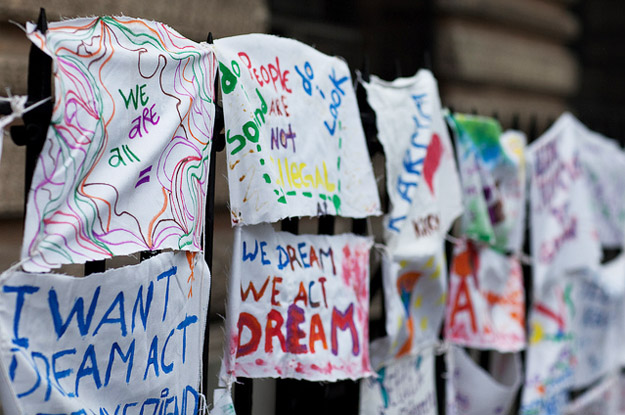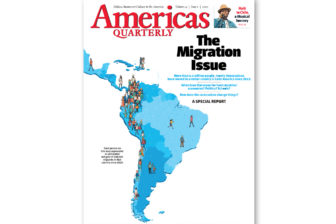Paper plays an outsized role in Amalia Rojas’ life. A lack of papers – or at least a lack of the right ones – diverted her college dreams when, at 18, she found out she hadn’t been born in the U.S. and didn’t have the legal status she needed to apply for financial aid.
Six years later, the promise of those papers – and a fear that the election of Donald Trump would spoil the tenuous status she’d earned in the U.S. under the Deferred Action for Childhood Arrivals (DACA) policy – prompted her to consider marriage long before she’d ever planned.
And it’s on paper – as a budding playwright – that she now tries to work out what it means to be young, undocumented, and living in the United States under what many politicians on left and right agree is a badly broken immigration system.
Brought to the U.S. when she was just two months old, Rojas, 24, is one of 11 young undocumented immigrants to take part in this year’s DREAMers Project Workshop, a creative writing program sponsored by PEN America and the City University of New York (CUNY) and taught by Mexican novelist and essayist Álvaro Enrigue.
The program, now in its second year, draws applications from CUNY students and recent graduates who want to use creative writing to explore the politics and sociology of immigration, as well as the way these policies impact their most personal decisions. This year’s group included students born in Mexico, Central America, Germany and elsewhere.
Though Rojas and other participants of the workshop are able to stay in the U.S. thanks to DACA, the possibility that the policy could be rescinded or their status otherwise changed is a constant concern. This makes their choice to write and speak openly about their experiences all the more courageous, Enrigue said.
“The members of the DREAMers Project Workshop put very serious things at risk every time they participate in a public reading,” Enrigue told AQ. “As James Baldwin said, ‘To act is to be committed, and to be committed is to be in danger.’ Reading in public, a DREAMer gives testimony of one of the most extreme and bold ways of being an American writer in our days.”
For Rojas, that journey started later than planned; after her status prevented her from attending a four-year college straight out of high school, she spent the next two years saving up enough to attend community college in New York. She graduated from Lehman College last year, and told AQ that she wanted to write a play to show “how we let papers dictate our love life and the way we love others.”
“The joke was that all the DACA recipients would get married in January,” Rojas laughed, referring to the belief that Trump might vacate the DACA order after his inauguration on Jan 20. “I ended up not getting married – but I really thought I was going to.” The play she wrote for the workshop, titled Waves (They Know Everything) centers on two young Salvadoran women trying to navigate love, the dating scene, and marriage amid their own murky immigration status.
Such practical concern – of how being undocumented impacts one’s daily life – is a common theme for the young writers. Orlando Gil, 21, also participated in this year’s program. His short story is about a young man who has “fancy, shiny things dangled in front of him” but is unsure of how to go about getting them. Gil told AQ that the first time his status really registered with him was when, at 13 or 14, he found himself without the papers he needed to apply for a job as a busboy alongside his father at a local restaurant.
“I think the milestone for many undocumented people is the moment that their lack of documents starts to really seep into their lives,” he told AQ. “For me that was when I started working.”
Gil’s parents brought him to the U.S. from Mexico when he was seven – at first not intending to stay. But when his father’s work visa expired, they decided that they could have a better life by remaining in the U.S. Gil said his father wanted him to get a job in the restaurant so he could understand what it was like to work “60 hours a week, for lousy pay and lousy hours, for a boss who yells at you,” he explained. “Being in that work environment was not the life he wanted for me. He wanted me to see that firsthand.”
Both Gil and Rojas said they view the U.S. as a place where people can work hard and succeed with fewer limits than in Mexico. But for both, life in the U.S. has come with challenges. Gil said he hasn’t seen his two sisters, who are still in Mexico, in nearly 14 years, and that as an immigrant he has never really felt a sense of belonging. Rojas said that her experience, too, has at times felt like the betrayal of an implicit promise: She worked hard as a student and won her place at university, but then faced a roadblock on her path to becoming who she wanted to be.
“My play takes place in 2010, when the DREAM act was denied in Congress,” she said. “I watched it be denied, and I wanted to be able to communicate through words what it feels like to see the possibility of a door opening, and then it being closed.”
What both Rojas and Gil make clear is that they will not silently observe their dreams deferred. Asked about how his cohort responded to the Trump administration’s promises to tighten U.S. immigration policy, Gil said that, far from diminished, the group was “empowered.”
“The great thing about young people is they’ve got fight in them,” Gil said. “Especially writers… writers aren’t gonna fold just because an administration is politically bashing who they are and the community they represent.”
Gil and Rojas will share their work at Americas Quarterly’s special event on U.S.-Mexico relations this Thursday, May 18 at the Americas Society in New York. The event will also feature remarks from Enrigue and Mexican Consul General Diego Gómez Pickering, and a panel discussion featuring chef and TV personality Pati Jinich, the CEO of the U.S.-Mexico Foundation Rebeca Vargas, journalist Alfredo Corchado, and analysts Shannon O’Neil and Duncan Wood, moderated by AQ’s editor-in-chief Brian Winter. Register here to attend, or tune into the live webcast starting at 6:30 pm.
—
Russell is a senior editor for AQ






